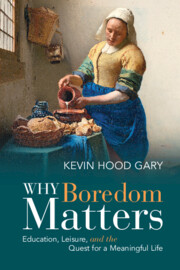‘… [this] important and insightful book challenges readers to consider the moral and practical dimensions of boredom so that we might educate for lives of meaning. He gathers a range of sources from across time, traditions, and disciplines, and he puts these in conversation with our everyday experiences of boredom in the modern world, while also exploring ways that boredom has been written about and experienced in the past. It is an excellent book.’
Jeff Frank
Source: Philosophical Inquiry in Education
‘Why Boredom Matters is one of those delightful books in which the author seamlessly draws from thinkers from across multiple disciplines such as education, theology, philosophy, literature, and pop culture. Søren Kierkegaard, Walker Percy, David Wallace Foster, Leo Tolstoy, Robert Louis Stevenson, John Dewey, Albert Bormann, Simone Weil, Josef Pieper, St. Benedict, Groundhog Day, and The Karate Kid all contribute to a richer understanding of boredom.’
Elizabeth Amato
Source: Law & Liberty
‘[This] is a significant and welcome book, and one hopes that it will be read and discussed by many in these troubled times … Gary’s book is a critical warning and admonition to contemporary society.’
Henry T. Edmondson III
Source: The University Bookman
‘Gary’s book served as an exercise and an apprenticeship in leisure that helped me to practice it as I read and has kept me inspired … The book is focused yet full of quite a lot of ideas and it never feels rushed. Gary moves between a broad range of thinkers from different disciplines with a care and attentiveness that introduces me as a reader to someone and their ideas in a manner that allows me to really talk with them.’
Cara Furman
Source: Studies in Philosophy and Education
‘I take Gary’s contribution to the scholarly literature on boredom as a welcome invitation to culturally, geographically, and contextually wider representations of boredom and leisure to irrigate our minds to the possibilities of constructively and creatively responding to situational and existential boredom. I hope that scholars far and wide look to this book as an example of an inquiry that takes an enduring facet of the schooling experience and responds to it, not with further constraints, but as an opening of the question to spur the exploration of leisurely ways of being.’
Vikramaditya (Vik) Joshi
Source: Studies in Philosophy and Education
‘… a text full of wise insights into how to live one’s life.’
René V. Arcilla
Source: Studies in Philosophy and Education



